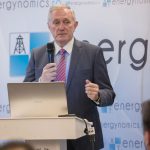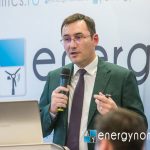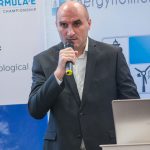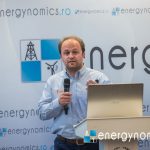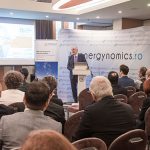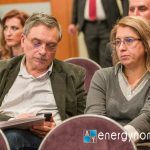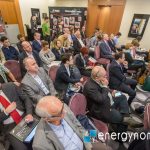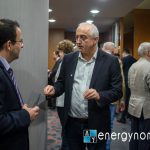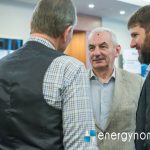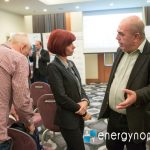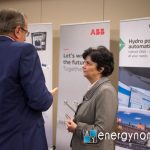The Energy Breakfast Club’s November 1st edition – “Reinventing Utilities – Who Writes The New Playbook” identified the key trends in the electricity, gas and heat distribution sectors, based on complementary perspectives from qualified and hand-on expert speakers. ANRE, CEZ Romania, MET Romania Energy, ELCEN, Ringhel and Control Point were the organizations that contributed, through their representatives, to a good conversation with clarifying ideas.
Maria Mănicuță: Investments at the level of annual amortization
Maria Mănicuță, general director in the National Regulatory Authority for Energy, referred to the changes introduced in 2018 in the regulatory framework for electricity and gas distribution sector. “In the preparation of the forthcoming regulatory period, the Authority has intended to modify the methodologies for distribution tariffs, thus answering the criticisms of the Court of Accounts, as well as the comments received from the specialized committees in the Parliament”, explained Maria Mănicuţă. In 2018, the methodology for setting the electricity distribution tariffs was approved, those for natural gas were launched for public debate and, in a few months time, the tariffs for the transportation services (electricity and gas) and for the natural gas storage will follow.
One of the guiding principles is the unitary treatment of costs in both sectors, and the other is to stimulate the development of the gas market, taking into account the lessons learned in the electricity market.
For the fourth regulatory period, taking into account the need for network investment and also the limited purchasing power of consumers, ANRE set the regulated profit rate based on a lower weighted average cost of capital (WACC). “Our idea was that a lower profit for the distribution operators would allow for a larger volume of investments to be made with the same money supply”, explained Maria Mănicuţă. “Operators viewed this differently and they say that without proper incentives they cannot make investments, as it doesn’t worth the effort. There is still a heated discussion between ANRE and operators, but we are all aware that we need to reach a consensus.”
ANRE has determined that in the forthcoming regulatory period the level of investments should be at least equal to the value of the annual amortization. In April, when the Authority requested the first estimates for investment programs, four of the operators proposed higher volumes than the annual amortization rate. “Now all operators are near this level”, explained Maria Mănicuţă.
CEZ maintains the same investment level
The volume of investments in Oltenia’s electricity distribution network will continue to be ambitious, said Adrian Borotea, Director of Group Strategy and EU Agenda within CEZ Romania.
In reference to the remuneration of the invested capital, Adrian Borotea said that the negotiations with the regulator led to “values that could be higher, but which are fair”. “The additional percentage for the really new investments to be made is a good thing. To the extent that the other parameters in the methodology, such as the maintenance costs, the costs with own technological consumption (CPT), are recognized and transferred into tariffs, we consider that a lower level of WACC is fair for everyone”, CEZ official explained.
Petre Stroe: Integrated companies will be those to survive
The market must evolve towards digitization and smart metering, a direction that MET Romania Energy has fallowed with determination, through partnerships already under way with Romanian start-ups that aggregate local intelligence and initiative, said Petre Stroe, CEO of the company. “As new and small firms penetrate harder in the practical area, we have assumed the role of supporting them, in order for all of us – producers, distributors, suppliers, regulators – to meet customer demands.”
MET Romania Energy has developed a program through which smart metering for industrial consumers is already implemented. To accelerate the implementation of such solutions, Petre Stroe has advocated for better collaboration among all stakeholders, and specifically asked for open access, under certain conditions, to smart data generated. “At present, if the distributor installs such an equipment, the supplier can only come with the installation of a control meter, which is a waste of resources.” The idea was accepted by the ANRE representative, who even stated that, in 2019, the Authority will amend its supply regulation and distribution contract to oblige distribution operators to make data collected by smart meters available to third parties faster, even real-time. “It’s absurd to have a smart meter from the distributor and another from the supplier. […] It is absurd for the supplier to spend extra money if all the costs of smart metering are already recognized in the distribution tariff”, said Maria Mănicuţă.
The companies of the future are those that understood and will be able to integrate their businesses on vertical in order to control and optimize all specific operations, from production, supply and services to customers. “We at MET, in addition to supply, are already involved, together with our partners, in smart metering services and other energy services, but also in manufacturing of e-charging stations. We also intend to enter the power generation based on natural gas”, said the executive director of MET Romania Energy.
Petre Stroe also insisted on the need to inform and educate clients. “It’s a lot of work in this regard because the beneficiary of distribution and supply services is still focused solely on price and they do not really understand such benefits as fast real-time balancing that comes with smart metering, for example”, said Petre Stroe.
Digitalization for Utilities – What’s next
Mihai Dârzan, General Manager of Ringhel, presented six trends influencing the future of utility services from the perspective of the technology company that has developed the first integrated system for the energy, gas and PRE markets in Romania, starting from 2011. “Currently, over 45% of electricity and 25% of natural gas in Romania are managed through our platforms”, said Mihai Dârzan.
[fruitful_ibox_row]
[fruitful_ibox column=”ffs-two-one” title=””]
- Consumers are open to technology
- Suppliers need state-of-the-art software applications
- Increased complexity in supply activity requires multiple-layer connections, communication and exchanges
[/fruitful_ibox]
[fruitful_ibox column=”ffs-two-one” title=”” last=”true”]
- Artificial Intelligence, NLP and Automation
- Increased security and protection of personal data (GDPR)
- Advanced technologies and Big Data
[/fruitful_ibox][/fruitful_ibox_row]
DOWNLOAD THE PRESENTATION OF MIHAI DÂRZAN
Ringhel, the leading provider of IT solutions and services dedicated to the Romanian power and gas markets, recently concluded two contracts with Serbian utilities, thus expanding its activity in the neighboring country.
The reorganization of the centralized heating system in Bucharest is a must as investments are urgent
Claudiu Crețu, special administrator of ELCEN, presented the company’s prospects after the reorganization plan was approved by the creditors’ meeting and then confirmed by the syndic judge, thus passing the legality test. “The process of actives being transferred to the municipal company that will integrate the district heating system is a long one, as it is a rather complex process; integration of course also involves the transfer of the transport and distribution part from RADET”, Crețu said. “We are prepared for the winter, we have completed the gas purchase contracts and made the necessary repairs, as far as possible”, he said.
The ELCEN representative said the approval of the reorganization plan and the process of integrating the system create the premises for investments, which are absolutely necessary and urgent, after decades of constant degradation of the centralized heating system in Bucharest. “From a technical point of view, there is a need for serious and urgent investments all along the value chain in order to keep the system running”, Claudiu Creţu insisted; according to him, Bucharest has no alternative to the centralized system. “It is important to understand the benefits of this integrated system from the quality of life in the city, which is closely related to the quality of the air we breathe.”
The district heating system in Bucharest has a tremendous potential, Claudiu Creţu said, also mentioning the biggest challenge for the business community: to identify and apply solutions that would integrate two such colossi. “ELCEN and RADET will need integrated IT systems to analyze data and help take management decisions”, Crețu said.
Optimizing costs for wastewater plants
In turn, Romulus Berdei, General Manager of Control Point, presented some of Valmet solutions for solids measuring in municipal and industrial wastewater plants. Valmet’s advanced measurement technology and controls equipment optimizes costs in sludge dewatering systems across the entire process chain. “Depending on the characteristics of the system, investment can be paid back even in couple of months,” said Romulus Berdei, who then listed the benefits for municipal and industrial wastewater plants:
[fruitful_ibox_row]
[fruitful_ibox column=”ffs-two-one” title=””]
- Fewer laboratory analyses
- Improved process stability
- Savings in time and chemicals
[/fruitful_ibox]
[fruitful_ibox column=”ffs-two-one” title=”” last=”true”]
- Lower need for instrument maintenance and maintenance costs
- More efficient energy consumption
- Real-time measurements and data
[/fruitful_ibox][/fruitful_ibox_row]
DOWNLOAD THE PRESENTATION OF ROMULUS BERDEI
Energy Breakfast Club was organised by energynomics.ro with the support of our partners: ABB România, CEZ România, Control Point powered by Valmet, MET România Energy, Ridgid Emerson, Ringhel.
Around 40 representatives from AIIR Valahia, Almaj&Albu SCPA, Belvedere, Camera de Comerț România-Turkmenistan, ELCEN, Electrica, EnergoBit, Facultatea de Administrare a Afacerilor, Fondul Român pentru Eficiența Energiei, INCDE-ICEMENERG, Informatica Feroviară, Institutul National de Cercetare-Dezvoltare în Informatică, Investisia Group, Liga Asociațiilor de Proprietari Habitat, revista Mașini și Utilaje, Metarom Industries, Quartz Matrix, RADET București, RADET Constanța, Renomia, revista Electricianul, Ringhel, Sixt, Talent Center, Tinmar, Transelectrica attended the presentations and participated in discussions.
Participation
This year, energynomics.ro will organize 10 Energy Breakfast Club meetings. The schedule and the proposed themes for 2017 are available in the Energy Breakfast Club dedicated page.




